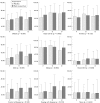Acupuncture treatment in irritable bowel syndrome
- PMID: 16150852
- PMCID: PMC1856122
- DOI: 10.1136/gut.2005.074518
Acupuncture treatment in irritable bowel syndrome
Abstract
Background and aims: Despite occasional positive reports on the efficacy of acupuncture (AC) on functions of the gastrointestinal tract, there is no conclusive evidence that AC is effective in the treatment of irritable bowel syndrome (IBS).
Patients and methods: Forty three patients with IBS according to the Rome II criteria were randomly assigned to receive either AC (n = 22) or sham acupuncture (SAC) (n = 21) using the so-called "Streitberger needle". Treatment duration was 10 sessions with an average of two AC sessions per week. The primary end point was improvement in quality of life (QOL) using the functional digestive diseases quality of life questionnaire (FDDQL) and a general quality of life questionnaire (SF-36), compared with baseline assessments. QOL measurements were repeated three months after treatment.
Results: Both the AC and SAC groups improved significantly in global QOL, as assessed by the FDDQL, at the end of treatment (p = 0.022), with no differences between the groups. SF-36 was insensitive to these changes (except for pain). This effect was partially reversed three months later. Post hoc comparison of responders and non-responders in both groups combined revealed a significant prediction of the placebo response by two subscales of the FDDQL (sleep, coping) (F = 6.746, p = 0.003) in a stepwise regression model.
Conclusions: Acupuncture in IBS is primarily a placebo response. Based on the small differences found between the AC and SAC groups, a study including 566 patients would be necessary to prove the efficacy of AC over SAC. The placebo response may be predicted by high coping capacity and low sleep quality in individual patients.
Comment in
-
Stratification by sex and subgroup is necessary for RCT on IBS.Gut. 2006 May;55(5):743-4; author reply 744. Gut. 2006. PMID: 16609138 Free PMC article. No abstract available.
References
Publication types
MeSH terms
Substances
LinkOut - more resources
Full Text Sources
Other Literature Sources
Medical

